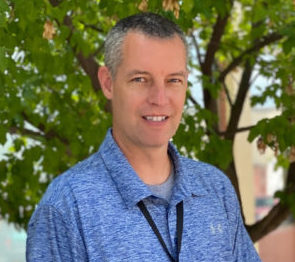Every day, our CHART* and Outreach team members walk alongside our neighbors who are experiencing homelessness. In light of Accessibility Awareness Month, I want to take a moment to recognize the unique challenges that a person with a disability may face as they’re navigating homelessness, and to share a story of how our community worked together to serve their unique needs.
Walking alongside Isaiah**
Earlier this year, Isaiah was referred to us through a CHART referral from 211***, and in reviewing the file, we learned he was navigating multiple disabilities as a person who was deaf, mute, illiterate, and understood limited sign language. At the time, he was living unsheltered and was understandably unwilling to go to a homeless shelter because of past trauma he’d experienced, as he was a target for thieves who took advantage of his inability to report the theft.
Our objective for each client is to get them assessed via CHART since this opens up potential rapid-rehousing or diversion opportunities. Without the assessment, Isaiah wouldn’t be able to move beyond his current situation. We knew right away that communicating with him was our biggest challenge and we needed to work together to identify creative solutions to meet his needs.
Our first step was to connect with our community partners who could help us determine the best course of action. We started with reaching out to our trusted partners at Community Services Group and Union Community Care, who then put us in touch with the Disability Empowerment Center (DEC). This team was willing to walk alongside Isaiah with us to provide a sign language interpreter for Isaiah’s CHART assessment.
On the day of the assessment, Isaiah, who was accompanied by his neighbor, met with two CHART workers, one who spoke English and the other who was bilingual. This way, the DEC team member could interpret the CHART assessment to him via sign language, and then translate his answers for us. As an added and unexpected bonus, the DEC team member had already worked with Isaiah in the past, and could provide the comfort of a familiar face in addition to offering the essential translation services to accommodate Isaiah’s needs. We are grateful for the critical role they played in this interaction.
The next challenge was to find a safe shelter space for Isaiah as soon as possible. The DEC recommended we reach out to the team at PAHrtners of Philadelphia, as they offer residential housing for people with disabilities. When we asked Isaiah his opinion on this plan, he smiled from ear to ear and said he would love to live in a community with other individuals who are deaf and mute. He shared, with a sense of sadness, that his whole world is silent and he has no relationships. This would unlock an opportunity for him to gain a sense of community.
Calls to PAHrtners revealed that clients must have a support coordinator to qualify for residential housing and suggested we start with our partners at the Lancaster Behavioral Health and Development Services. This team provided clarity on the steps he would need to take to qualify for a support coordinator.
From there, our partner at the Office of Aging, who was already working with Isaiah, was willing to shepherd him through the remainder of the process to establish his eligibility.
During this process, it was incredible to see the collaboration, as each community partner was committed to playing a role in walking alongside Isaiah to break down barriers and empower him with resources he could use to unlock a new path forward.
Our commitment to making progress
While we’ve made significant progress in serving people who are navigating disabilities, we know we still have more work to do. This is why our Tenfold team is committed to making ongoing enhancements through our Diversity, Equity and Inclusion plans. At our recent staff meeting, we completed an “environmental scan” as part of our trauma-informed care approach so we can identify areas of improvement, and take steps to make accommodations that will elevate our client’s experience.
Join us!
Join me and my teammates at the Camp Out for Homelessness to Housing on November 18 during the ExtraGive. Together, we can raise awareness and critical funds to empower our neighbors to unlock a new path forward to overcome homelessness, achieve housing stability, prepare for homeownership, and access financial security.
To register or learn more, visit: www.WeAreTenfold.org/Camp-Out
*CHART – Community Homeless Assessment & Referral Team
**Client’s name changed to protect their privacy.
***Individuals and families experiencing homelessness should contact 2-1-1.
2-1-1 is an Information & Referral program. The 211 team serves as one point of contact that can provide information on resources and provide referrals as a faster and more efficient way to connect people to the organizations that are equipped to address their unique situation.


